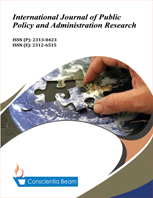Institutionalising and Mainstreaming Policy Analysis Culture in African Environments
Abstract
An institutionalised culture of policy analysis lays the basic infrastructure for promoting systematic policy formulation, implementation, monitoring and evaluation. This article reviews inroads made towards mainstreaming a culture of policy analysis in the African policy landscape. The concern for an institutionalized culture of policy analysis dates back to the first decade of independence where it underpinned nation building and economic transformation processes across Africa. To date, the African policy landscape boasts of an expansive supportive institutional framework for policy analysis in the form of universities, independent research and training institutes, professional policy lobby groups and highly probing parliamentary portfolio committees. Specialized policy analysis review units (PARUs) have also been created in most government ministries and departments. Notwithstanding these developments, efforts towards mainstreaming policy analysis best practices are compromised by interactive factors of turbulent political environments, skills flight, institutional corruption, inadequate budgetary support for research and mutual mistrust between governments and universities and independent Think Tanks. Utilization of university research outputs is low note. African governments should take more concerted effort to forge strong research partnerships with national universities and think tanks.

